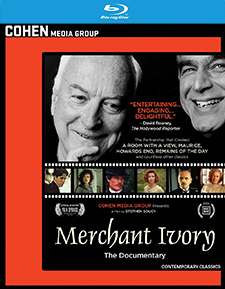Merchant Ivory: The Documentary (Blu-ray Review)

Director
Stephen SoucyRelease Date(s)
2023 (November 12, 2024)Studio(s)
Cohen Media Group/Modernist Film (Cohen Media Group/Kino Lorber)- Film/Program Grade: A
- Video Grade: A
- Audio Grade: A
- Extras Grade: A-
Review
In 2015, Cohen Media Group acquired the Merchant Ivory library, so Stephen Soucy’s documentary about the classy, long-running film company (founded in 1961) serves as much a means to promote this catalog, though Soucy’s film was far more interesting and informative than I expected.
Probably like many, for me Merchant Ivory productions were all but required viewing for about 10 years, during their peak period, roughly from 1984’s The Bostonians through 1995’s Jefferson in Paris, with must-see arthouse titles such as A Room with a View (1984), Maurice (1987), Mr. and Mrs. Bridge (1990), The Ballad of a Sad Café (1991), Howard’s End (1992), and The Remains of the Day (1993; my favorite of their films), sandwiched in-between.
Also, like many, I was only dimly aware of the company’s early work in India, and missed completely later, much less acclaimed projects such as The Golden Bowl (2000), Le Divorce (2003), and The City of Your Final Destination (2009), the last Merchant Ivory production.
Merchant Ivory: The Documentary (or, as it appears onscreen, Merchant | Ivory), tells a fascinating story of disparate, indefatigable talent—Indian Muslim Ismail Merchant, Oregonian Protestant James Ivory, German Jew novelist and screenwriter Ruth Prawer Jhabvala, and later New York-born composer Richard Robbins. Though mostly born to conservative families, their adult lives were anything but conventional: Merchant and Ivory were domestic as well as business partners. Robbins, also gay, later had a long affair with Merchant, and possibly a fleeting one with Ivory, all while living together along with Jhabvala and sometimes others, commune-style, primarily at Ivory’s Upstate New York house.
Ismail Merchant died unexpectedly following routine surgery in 2005, at the age of 68, but James Ivory, nearly 97 but amazingly vibrant and looking at least 20 years younger, is interviewed extensively for the film. Though his and Merchant’s sexuality was an open secret, it wasn’t publicly discussed until after Merchant’s death. In the film Ivory is matter-of-fact frank in most respects, a little guarded in other ways.
Today, Ivory suggests a heartier, healthier Robert Wise, and like Wise seemed to have had a similar approach to directing: meticulous pre-production research and planning, hiring the best actors and mostly let them get on with it, a soft-spoken, calm, even unflappable demeanor on-set.
Ismail Merchant was, by all accounts, the polar opposite: highly-strung, flamboyant, given to frequent outbursts, and more than a little shady. One of the many surprises of Soucy’s film is how, throughout its existence, Merchant Ivory made films on a wing and a prayer. They often began shooting without adequate financing in place; actors, caterers and others weren’t paid on time, Merchant himself cooked meals for the crew to save money (and stave off a rebellion). In its frankness, the film depicts Merchant as something like an arthouse Harry Alan Towers, the only major difference being Towers produced mostly terrible films while Merchant produced many great ones. Ivory himself admits Merchant was, effectively, a con man, arguing that, well, all successful producers are.
The movie is chockful of honest interviews, casts and crews, including Helena Bonham Carter, Emma Thompson, Hugh Grant, James Wilby, Greta Scacchi, Vanessa Redgrave, Felicity Kendal, Simon Callow, Rupert Graves, and James Fox, along with editors, cinematographers, costume designers and the like. Notably absent is Anthony Hopkins, who alleged that on The City of Your Final Destination, typically underfinanced, he and other members of the cast and crew were either never paid or underpaid. To its credit, the documentary addresses this, too.
Regardless, the film clips of familiar and unfamiliar titles dazzle, almost all of which, even the earliest and most obscure ones, are sourced from excellent HD video masters. Indeed, the film clips look so good, I wonder if, to some degree, the decline of Merchant Ivory from the mid-1990s forward can be traced to the parallel decline of arthouse theaters (which often had small screens and poor sound systems to begin with), and the fact that home video technology of the time really didn’t do their sumptuous-looking movies justice.
Whether or not the documentary was conceived as a marketing tool, it’s so well-made that it certainly does its job well. It made me anxious to see the early Merchant Ivory films produced in India, Merchant shrewdly negotiating financing from Hollywood companies for Rupees tied up there, movies that, in one case, no less than Satyajit Ray consulted on. (Merchant, in his youth, sought out Ray as a mentor.) The film also makes a strong case for some of the later Merchant Ivory films greeted with mixed or even hostile reviews when they were new, persuasively arguing that some of these films have greatly improved with age.
Cohen Media Group’s Blu-ray of Merchant Ivory is presented in 1.85:1 widescreen, 1920 x 1080p, which film clips appropriately adjusted for that aspect ratio. The high-def original material mixes well with the mostly remastered film clips. Audio is offered in both DTS HD Master Audio 5.1 and 2.0 stereo mixes, supported by optional English subtitles. The disc is Region “A” encoded.
The bountiful supplements include extended interviews, including with one subject who didn’t make the final cut, actor Hiroyuki Sanada; an Ivory and Soucy introduction at the New York Indian Film Festival, and a conversation between the two at the NYSWI Film Festival. Also included is the featurette Rich Atmosphere: The Music of Merchant Ivory Films and a trailer.
Richer and more interesting than I expected, Merchant Ivory is one of the best filmmaking documentaries I’ve seen in long while and highly recommended.
- Stuart Galbraith IV

